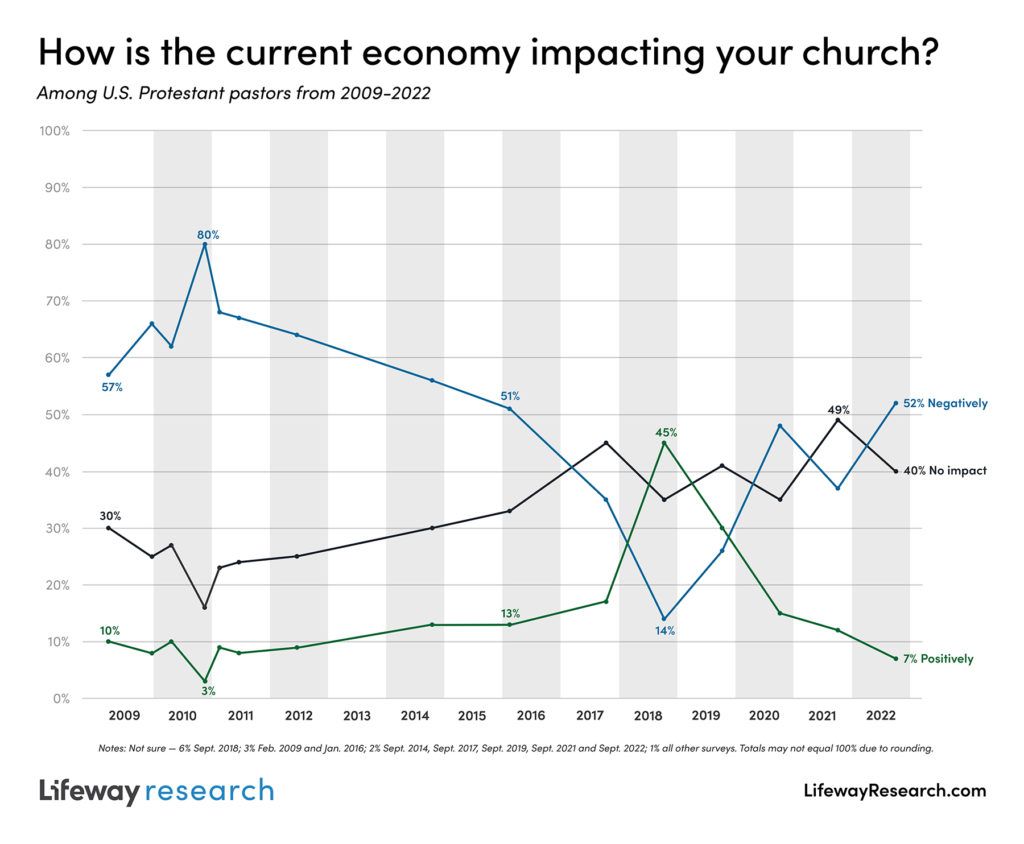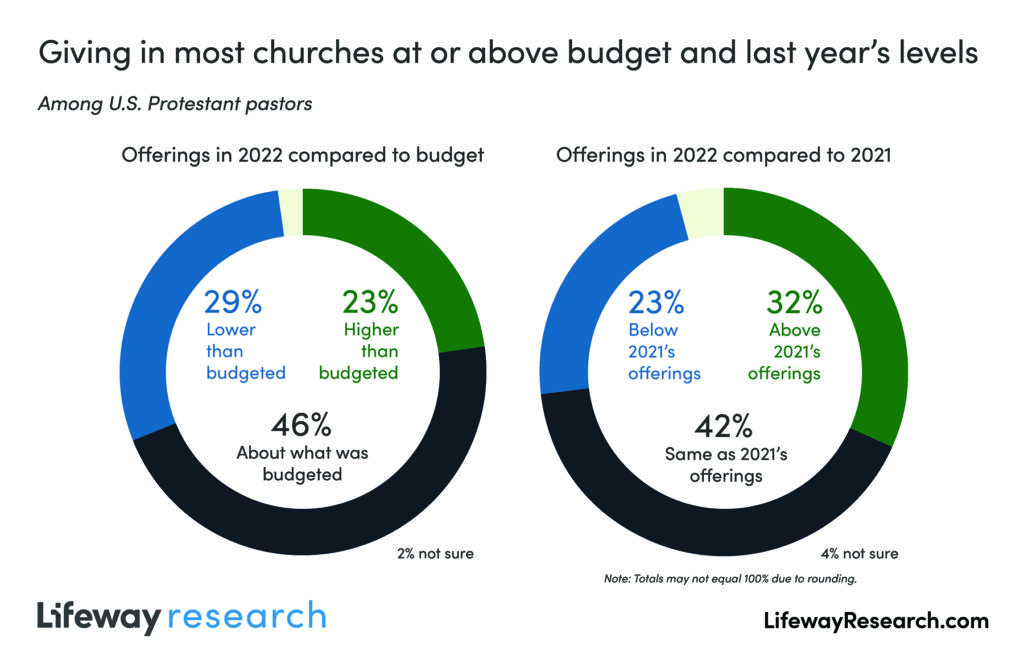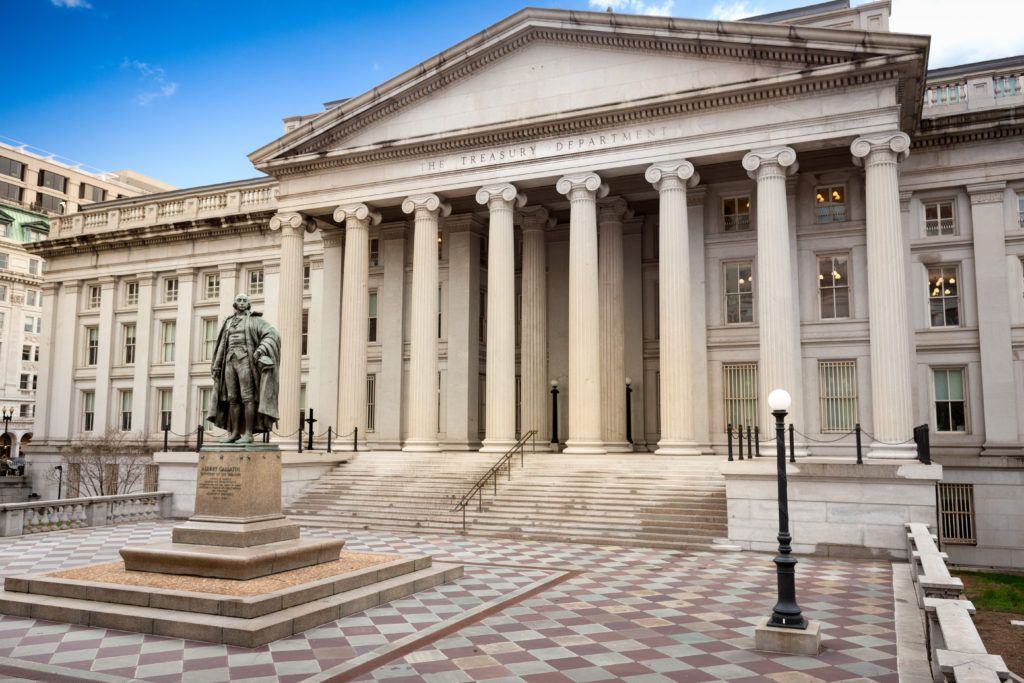
NASHVILLE, Tenn. — Individuals aren’t the only ones facing consequences of inflation and other negative economic factors in the U.S., as many pastors say their churches are being harmed as well.
A Lifeway Research study of U.S. Protestant pastors found 52% say the current economy is having a negative impact on their churches. For 40%, the economic circumstances aren’t having any effect. Fewer than 1 in 10 pastors (7%) say the current economy is a positive factor for their churches.
The economic outlook among pastors has soured more in 2022 than in recent years. Last year, around half of pastors (49%) said the economy was having no impact. Only once in the previous five years, during the height of the COVID-19 pandemic in 2020, were pastors most likely to be pessimistic about the economic impact on their congregations. During this time, pastors had been more likely to say the economy was having no effect. The two years prior to the pandemic were the only two years in the study’s more than 13-year history when pastors were more likely to say the economy was having a positive impact than a negative one.

2022 marks the first time since 2016 that more than half of pastors feel the economy is having a negative impact on their churches and the first time since 2012 that fewer than 10% of pastors see the economy as having a positive effect.
“Outside economic forces are back to being a negative influence for most churches, according to their pastors,” said Scott McConnell, executive director of Lifeway Research. “As temporary assistance from the CARES Act expires and prices and interest rates rise, churches are noticing the impact on their finances.”
Giving remains stable
Despite reporting a negative impact, most pastors say congregational giving is at least staying around the budget and in line with the previous year.
Around 7 in 10 U.S. Protestant pastors say giving at their church so far this year is at or exceeding their budget, including 46% who say giving has been about what was budgeted and 23% who say it’s higher. Close to 3 in 10 (29%) say giving is below their 2022 budget.
Compared to last year, almost 3 in 4 pastors say their offerings so far in 2022 are at or above 2021 levels, with 42% saying it’s the same as last year and 32% say it’s above. For 1 in 4 churches (23%), offerings are below 2021.

“The souring of pastor attitudes towards the economy is more about rising expenses than declining income,” said McConnell. “Declining year-over-year giving is a factor for almost a quarter of churches, but this is a similar rate to what churches have averaged for over a decade.”
When asked to place a percentage on the changes in offering for their congregation, around 3 in 4 say it is the same as 2021 or above. Specifically, 45% say it is the same, 9% say offerings have increased by 1-9%, 15% say it’s up 10-24% and 5% say their offerings in 2022 are up 25% or more compared to 2021. Around 1 in 5 report a decrease in giving, including 4% who say offerings are down 1-9%, 11% who say they have declined 10-24% and 6% who report their offerings being down 25% or more.
Small church struggles
The current economy is not having the same impact on all churches. Some are more likely to report financial struggles. Despite having recovered to pre-pandemic attendance levels more quickly, smaller congregations are among those most likely to say they are facing economic headwinds.
Small church pastors, those with congregations of less than 50 attendees, (61%) are the most likely to say the economy is negatively impacting their churches. These churches are more likely than churches with more than 100 in attendance to say giving is about what they budgeted, but they’re the most likely to say offerings in 2022 are below 2021 levels (31%). Meanwhile, pastors at the largest churches, those with 250 or more, are the most likely to say offerings so far this year are above last year’s levels (63%).
“Churches with attendance of less than 50 have fewer people to cover the expenses of the church,” said McConnell. “When prices rise there are fewer people to spread that cost among.”
Other congregations are also more likely to report economic troubles. Those in the Northeast (62%) are the pastors most likely to say the current economy is having a negative impact on their congregation. As it has been in recent years, African American pastors (36%) are more likely than their white counterparts (22%) to say their offerings this year are below what they were the previous year.
















